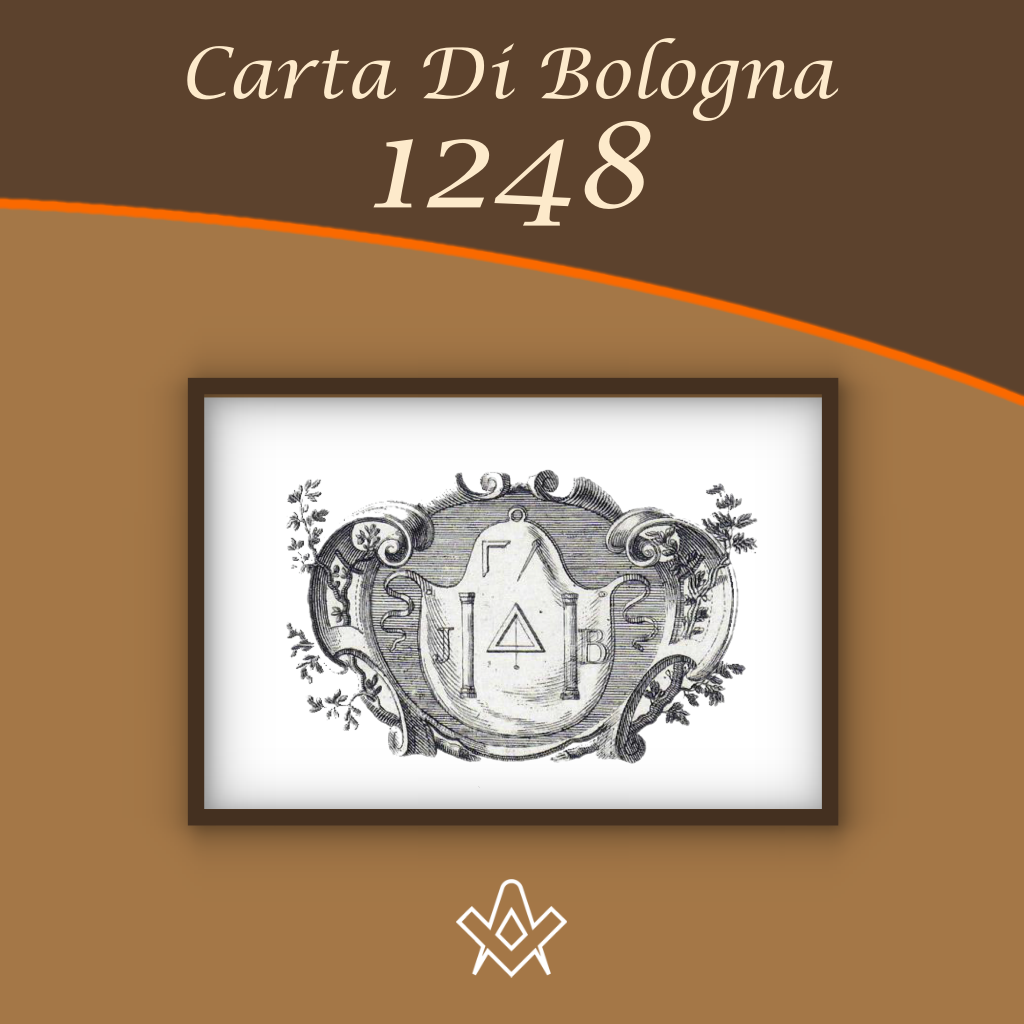The “Statutes and Regulations of the Society of the Masters of Masonry and Carpentry” was originally written in Latin by a notary of Bologna by order of the “Podestà” of Bologna, Bonifacio De Cario, and is dated: August 8, 1248.
Carta di Bologna (1248)
Statuta et Ordinamenta Societatis Magistrorum Tapia et Lignamiis
(Statutes and Regulations of the Society of the Masters of Masonry and Carpentry)
Translated by: Bro. Vincent Lombardo
This manuscript is currently preserved in the State Archives of Bologna.
Such an important document was inexplicably ignored by scholars of the history of Freemasonry — however much the causes of forgetting are obvious, given the widespread effort to emphasize only the English origins of the Freemasons — although it was published by A. Gaudenzi in the Bulletin of the Italian Historical Institute No. 21, corresponding to the year 1899, under the title: “The Societies of the Arts in Bologna. Their Statutes and Rolls”
The full bundle referred to as the “Carta di Bologna” consists of the manuscript and other documents dated 1254 and 1256, and has been reprinted in its entirety, with photographs of the original, in a book titled: “In Bologna. Arts and Societies from their Origins to the XVIII Century,” published in 1981 by the “Collegio dei Costruttori Edili di Bologna” — now already out of print.
Conscious of the importance of such a Masonic document, Bro. Eugenio Bonvicini edited it in 1982 along with an Essay of his own, presenting it officially at the “National Congress of the Sublime Councils of Ancient and Accepted Scottish Rite of Italy” gathered in Bologna that year.
The Journal Pentalpha published a summary of the work of Bro. Bonvicini (Florence 1984).
Furthermore, it was reproduced by Carlo Manelli in an issue of the “Massoneria a Bologna” (Athanor, Rome, 1986) and in the “Massoneria di Rito Scozzese”, by Eugenio Bonvicini (Athanor, Rome, 1988).
It is very clear that the “Carta di Bologna” is for all practical purposes the (original) Masonic document of Operative Masonry, the oldest one found to date.
It is 142 years older that the “Regius Poem” (1390); 182 years older than the “Cooke Manuscript” (1430-1450); 219 years older than the “Strasbourg Manuscript” recognized at the Congress of Regensburg in 1459 and authorized by the Emperor Maximilian in 1488; 59 years older than the “Preambolo Veneziano dei Taiapiera” [Stone Cutters] (1307).
The renowned Spanish historian specialist in Masonry, father Ferrer Benimeli, in his commentary on the “Carta di Bologna” says:
As much for the legal, as for the symbolic and representative aspects, the Statutes of Bologna of 1248, with the documents attached to it, connects us with an Operative Masonry that was thus far unknown, and that is of interest to the modern international historiography, particularly of Masonry, because it is placed, by its chronology and importance hitherto unknown, at the height of the British manuscript “Regius Poem” which is much newer, and that until now was considered the oldest and most important work.
The “Carta di Bologna” confirms the text of the Constitutions of Anderson of 1723, where he says of having drafted it after consulting the ancient statutes and regulations of the Operative Masonry of Italy, Scotland and many parts of England.
In reviewing the text of the “Statuta et Ordinamenta Societatis Magistrorum Tapia et Lignamiis,” there is no doubt that this was one of the statutes and regulations consulted by Anderson.
The statutes of 1248 were followed by those of 1254/1256, published in 1262, 1335 and 1336.
The latter was in effect and unchanged until 1797, when the “Società dei Maestri Muratori” was dissolved by Napoleon Bonaparte.
In 1257 the separation between the Masters of Masonry and the Masters of Carpentry, until then a single corporation, was officially agreed, though already independent in the works of their respective assemblies, but under the same Leaders.
In the same State Archive of Bologna is preserved a “Registry of Enrollment” dated 1272 and is attached to the “Charter of Bologna”, containing 371 names of Master Masons (Maestri Muratori) of which 2 are notaries, 2 other friars, and 6 nobles.
– Unknown author
Bologna (About this soundlisten); Bolognese: Bulåggna Latin: Bonōnia is the capital and largest city of the Emilia-Romagna region in Northern Italy.
It is the seventh most populous city in Italy with about 400,000 inhabitants and 150 different nationalities.
Its metropolitan area is home to more than 1,000,000 people.
It is known as the Fat, Red, and the Learn’d City due to its rich cuisine, red Spanish tiled rooftops, and being home to the oldest university in the western world.
Originally Etruscan, the city has been one of the most important urban centres for centuries, first under the Etruscans (who called it Felsina), then under the Celts as Bona, later under the Romans (Bonōnia), then again in the Middle Ages, as a free municipality and signoria, when it was among the largest European cities by population.
Famous for its towers, churches and lengthy porticoes, Bologna has a well-preserved historical centre, thanks to a careful restoration and conservation policy which began at the end of the 1970s.
Home to the oldest university in the Western world, the University of Bologna, established in AD 1088, the city has a large student population that gives it a cosmopolitan character.
In 2000 it was declared European capital of culture and in 2006, a UNESCO “City of Music” and became part of the Creative Cities Network.
In 2021 UNESCO recognized the lengthy porticoes of the city as a World Heritage Site.
Carta di Bologna (1248)
In the name of the Father and of the Son and of the Holy Spirit. Amen. In the year of the Lord 1248, the sixth indiction
[An indiction (Latin: indictio, impost) was a periodic reassessment of taxation in the Roman Empire which took place every fifteen years. In Late Antiquity, this 15-year cycle began to be used to date documents and it continued to be used for this purpose in Medieval Europe, and can also refer to an individual year in the cycle; for example, “the fourth indiction” came to mean the fourth year of the current indiction. Since the cycles themselves were not numbered, other information is needed to identify the specific year. – wikipedia ]
Statutes and Regulations of the Masters of Masonry and of Carpentry.
Here are the statutes and regulations of the Society of Masters of Masonry and Carpentry, made in the honor of God, of Jesus Christ, of the Blessed Virgin Mary and all the saints, and to the honor and prosperity of the city of Bologna and of the Society of said Masters, respecting the honor of the Podestà and of the Captain of Bologna who govern it or will govern it in the future, and respecting the present and future rules and regulations of the municipality of Bologna.
And that all the following statutes be applied henceforth from today, the eighth day of August of the year 1248, indiction sixth.
I. Oath of the aforesaid Masters.
I, master of Carpentry and Masonry, being now, or will be in the future, a member of the Society of said Masters, swear, to the honor of our Lord Jesus Christ, of the Blessed Virgin Mary and all the saints, and to the honor of the podestà and captain who now govern or will govern in the future, and for the honor and prosperity of the city of Bologna, to submit and obey the orders of the podestà and of the captain of Bologna and of all who may be governors of the city of Bologna;
to submit and obey any and all orders given to me by the Steward*) and by the Officers of the Society of Masters of Masonry and Carpentry, or by any one of them, for the honor and good name of the Society, and to preserve and maintain the prosperity of the Society and of its members, and to observe and comply with the statutes and regulations of the Society as they are regulated now or will be in the future without prejudice to all statutes and regulations of the municipality of Bologna, being specifically stated that I am bound to them from the time of my entrance [into the Society], and freed [from them] at my departure [from it].
And if I am called to the government of the Society, I will not refuse, but I will accept the assignment and I will conscientiously govern, guide and protect the Society and the members of the Society.
And I will equitably divide the tasks among the members of the society as I and the council of Masters deem fit.
And I will give and I will cause to be given the sanctions provided for by the statutes of the society and, in the absence of statutory rules, I shall impose penalties according to the will of the council.
And I will record in a register all the sanctions that I inflict for any infraction whatsoever, and I will authenticate and convey them to the Steward of the Society.
And the sanctions, funds or income of the society, the statutes, and all the treasury that the society is in possession, and all records or deeds relating to the society, it is required of the Steward, at the end of his term prescribed by the statutes, to convey and hand them over to the succeeding Steward at the assembly of the society, under the penalty of a fine of twenty Soldi Bolognesi.
And the Financial Auditors are required to investigate and to sanction this in the assembly of the society, unless prevented by a decision of the entire council of the Society, or by its majority, or for just cause.
And if I, as an officer, want to impose a levy for the expenses of the society, I will explain first the reason for it to the council, and it shall be imposed as the council decides unanimously or by majority.
II. About insulting words against the Officers or the Steward.
We constitute and decree that if any member of the society says insulting words against the officers or the steward, or against the notary, or accuse them of lies, he shall be punished with a fine of ten Soldi Bolognesi.
[The soldi / soldo was an Italian medieval silver coin, issued for the first time in the late 12th century at Milan by Emperor Henry VI. The name derives from the late Roman coin solidus.
It quickly became widespread in Italy, where it was coined in Genoa, Bologna, and numerous other cities. In Venice, the soldo was minted from the reign of Francesco Dandolo onward, remaining in use also after the republic’s dissolution in 1797 and during the Austrian occupation, until 1862. In the 14th century Florence, a soldo equaled 1⁄20 of a lira and 12 denari.
As time passed, the soldo started to be coined in billon and, from the 18th century, in copper. During the reign of Leopoldo II of Tuscany (19th century), it was worth three quattrini. The Napoleonic reformation of Italian coinage (early 19th century) made it worth 5 cents, while 20 soldi were needed to form a lira.
The term, used in medieval times to designate the pay of soldiers, became its synonym in both Italian and German (as Sold). ]
III. Sanctions to those who do not appear having been summoned to the appointed place.
We constitute and decree that if anyone is summoned by the officers, the steward or the Nuncio [i] to come to the place where the society assembles, he is bound to come every time and as often as he is asked or ordered, under the penalty of a fine of six denari [ii].
We constitute and decree that everyone is obliged to come to the place where the society meets every time and as often as he may be ordered or requested by the officers or the steward, or the nuncio, under the penalty of a fine of six denari Bolognesi.
And if he were not requested, everyone is obliged to come on the penultimate Sunday of the month, without notice, in good faith, without deception or fraud.
That not only he is so obliged by oath, but also liable to a penalty, even if he has not been ordered to attend.
And if he has come to a place where the society meets and leaves without the authorization of the steward or of the officers, he shall pay as fine twelve denari Bolognesi.
Except, in both cases, he has had a real impediment, or unless he was ill sick or out of town or at the service of the municipality of Bologna, in which cases, and in other cases as well, he can invoke his oath of obligatory service as justification. And if he excuses himself falsely, he shall be punished with twelve denari.
[i] Nuncio, a society’s legal messenger or representative.
[ii] Six denari = 1⁄2 soldo Bolognese.
[The denarius (Latin: [deːˈnaːriʊs], pl. dēnāriī [deːˈnaːriiː]) was the standard Roman silver coin from its introduction in the Second Punic War c. 211 BC to the reign of Gordian III (AD 238–244), when it was gradually replaced by the Antoninianus. It continued to be minted in very small quantities, likely for ceremonial purposes, until and through the tetrarchy (293–313).
The word dēnārius is derived from the Latin dēnī “containing ten”, as its value was originally of 10 assēs.[note 1] The word for “money” descends from it in Italian (denaro), Slovene (denar), Portuguese (dinheiro), and Spanish (dinero). Its name also survives in the dinar currency.
Its symbol is represented in Unicode as ???? (U+10196), however it can also be represented as X̶ (capital letter X with combining long stroke overlay).]
IV. Election of Officers and Steward and Meetings of the Society.
We constitute and decree that the Society of Masters of Carpentry and Masonry shall have eight officers, and also two stewards, namely, one for each Art of the society; and they shall be allocated proportionally to the Quartieri [neighborhoods], and elected in the Assembly of the Company according to the [electoral] lists, so that in each Quartiere [City Sections, or Quarters ] there are two officers, that is, one for each art.
And that the abovementioned officers and stewards remain in office for six months and no more.
And that they are obliged to ensure that the Society meets and congregates on the second Sunday of the month, under penalty of a fine of three Soldi Bolognesi every time they contravene, except when impeded by a real case of force majeure.
We add that the son of a master of the society should not and can not be registered on the electoral lists if he has not attained the age of 14 years at least.
And the father may not be obliged to enter him into the society before this age, and the son may not be accepted in the society before the appointed time.
And that no one may take an Apprentice who is less than twelve years old, under penalty of a fine of twenty Soldi and the contract so made remains null and void.
V. That no one can elect someone who is his Son or Brother.
We constitute and decree that no voter can elect his son or brother as Officer or Steward, and that such a vote is worthless.
VI. That the Masters do obey the Officers and the Steward.
We constitute and decree that if a member of the Society owes to another master a certain amount of money because of work, or if a master has a dispute with another due to, or because of the aforementioned [work], masters, then the masters who have this dispute between them are obliged to obey the rulings that the officers of the Masters of Masonry and Carpentry will establish between both, under the penalty of a fine of ten Soldi Bolognesi.
VII. How and in what manner the Masters enter [are admitted into] the Society and how much they must pay for their admission.
We constitute and decree that all masters who wish to become members of the Society of Masters of Masonry and Carpentry shall pay to said Society ten Soldi Bolognesi if they are of the city or county of Bologna; if they are not of the city or county of Bologna, they shall pay to the Society twenty Soldi Bolognesi.
And that the Officers shall endeavour conscientiously to ensure that all masters who are not members of the Society shall enter it.
And that this regulation is irrevocable, from which no one is exempted in any form or manner unless it is so decided by at least one-tenth of the Society, except for the son of a master, who can [is entitled to] enter the aforesaid Society without any payment.
And if the Steward or an Officer supports in Council or in the Assembly of the Society someone who would like to be exempted from paying to the Society the ten or twenty Soldi Bolognesi, then he be shall be punished with a fine of ten Soldi Bolognesi.
And If any member of the Society, sitting in the assembly or in the council, were to stand and say that someone should be exempted from the ten or twenty Soldi Bolognesi, he shall be punished with five Soldi Bolognesi.
And if a master has one or more sons who know the art of the above-mentioned masters, or who has been learning for two years with his father one of these arts, then his father shall make him enter into the Society with no [ceremony of] admission, paying to the Society as it has been said above, under penalty of a fine of twenty Soldi. And once the fine is paid, he is still bound to make the son enter into the Society.
And that the Officers and the Steward are required to collect all amounts due by those who have entered into Society, and the four Denari due for the church services, and the fines imposed during their term of office. And to cause them to take the oath in the Society.
And that the Steward shall receive from the Master who joins the Society a valid guarantee that, within less than a month after its admission into the society, he will pay ten Soldi if he is of the city or county of Bologna, as it said above; and twenty Soldi Bolognesi, if he is from another district. And if the Steward or the Officers do not collect these sums, within eight days after the one month delay, they shall pay to the Society from their own pocket and to give it sufficient compensation in cash or in pledges, so that the Society is well safeguarded.
And that the Financial Auditors are responsible for controlling everything said above and, if this is not observed, to condemn according to what is contained in the statutes of the Society.
We add that anyone entering the Society shall pay to the Society twenty Soldi Bolognesi for his admission. We ordain this for those who from now on will employ themselves to learn the art, and this is in effect starting today March 8, 1254, the twelfth indiction. Moreover, we ordain that those who do not take a Master [as teacher] to learn the art, shall pay to the Society three Libras [Libra = 20 Soldi] Bolognesi for their entry [into the Society].
VIII. No Master shall harm another Master in his Work.
We constitute and decree that no master of masonry and of carpentry shall injure another master of the Society of Masters, by accepting a work at a fixed price after it has been assured and formally promised [to another master] or obtained it by any other means or manner whatsoever.
Except in the case where some master comes bidding before the work has been formally promised and secured, and he asks for a share of it, then the one is obliged to give a portion of the work to the other, if he wants it.
But if a contract has already been made for that work, one is not bound to give the other a share of it, if he does not want to. And who contravenes shall pay three Libbras Bolognese as penalty each time he contravenes.
And the Officers shall impose the fines prescribe in the statues within one month after the offense is clear and manifest to them, respecting the laws and regulations of the municipality of Bologna.
And that fines and penalties shall be rendered to the administration of the Society and remain there.
IX. The Accounts that the Steward must render and the Duties of his Office.
We constitute and decree that the Steward of the Society of Masters shall be obliged to render an account [of his activities] to the Financial Auditors within one month after the expiration of his term of office, unless excused by the new Officers and by the Council of the Society or is prevented to do so by a real case of force majeure.
And that the Steward is required to account for all income and expenses incurred and made during his term of office.
And that all masters who have entered the Society during his time in office shall be recorded in a special register for the purpose of knowing whether they have paid or not.
And we command that all documents shall remain in possession [custody] of the Steward.
And that the Steward is required to deliver and convey in writing to the Steward succeeding him, during the assembly of the Society, all the records concerning the Society and all that he holds in custody relating to the assets of the Society, so that the assets of the Society can not in any way be subject to fraud.
And if the Steward fraudulently omits the foregoing and does not observe the above, he shall be punished by 20 Soldi Bolognesi.
And if he has fraudulently retained in its possession funds belonging to the Society, he shall restitute double the amount to the Society.
Likewise, the old Steward, after his departure from office, is required to give and convey to the new Steward on the first or second Sunday of the month all funds belonging to the Society, both the records pertaining the Society, as well as the treasure of this Society.
And the new Steward shall not extend the deadline for the old Steward to do so by more than fifteen days.
And that this requirement shall be irrevocable.
And if it is violated by any of the Stewards, the violation shall be punished by 20 Soldi Bolognesi paid to the Society.
X. Election of the Financial Auditors.
We constitute and decree that the Financial Auditors shall be elected at the same time as the Officers, and that there shall be two of them, namely one for each Trade.
That the Financial Auditors shall inspect carefully the Steward and the Officers in office at the same time as the Steward.
And if they discover that the Steward and the Officers acted wrongly in the execution of their duties and that they committed fraud or deceit, they shall be condemned to restitute the double of the funds discovered of being withheld and also to condemn them to return the equivalent of the compensation they had received.
And that they shall be obliged to do so and to inspect and convict or acquit within a month after the cessation of function of the Steward and of the Officers.
And whether they condemn or acquit they shall do this in writing to the assembly of the Society.
And if the Financial Auditors contravene and do not observe these regulations, that each of them shall be penalized by 10 Soldi and shall be expelled from office, except for a real case of force majeure or if they have leave from the Officers and from the Council of the Society.
XI. Transcription of the Reforms [enacted] by the Council.
In order to prevent any discord ever to develop among the members, we enact and command that all reforms of the Society of the Masters of Masonry and Carpentry or of the Council of said society shall be transcribed in a special register, and that the Steward and the Officers shall be required to have this done, under the penalty of a fine of five Soldi Bolognesi.
XII. That the Steward and the Officers shall render Account for their Charge only once and no more.
We constitute and decree that the Steward and the Officers of the Society shall render account of all receipts and expenses only once.
And after they have been examined once in regard to the accounts to be rendered, that they shall be no more called for a further rendition of accounts, unless they have been denounced or accused of having committed deceit or fraud, or for having unjustly appropriate the treasury [money] of the community and of the Society, in which case whoever may have accused them shall be heard.
And those who have been examined once shall not be examined again. And this rule applies for the past as well as for the future.
XIII. Orders to be given by the Officers and by the Steward.
We constitute and decree that all injunctions that are established by the Officers or the Steward, or by one of them with regard to money or other matters regarding the craft that a master is owed or owes to another master, that these injunctions shall be given and carried out within 10 days.
And if a master, to whom an injunction was given does not comply within 10 days, then the Officers and the Steward shall be required on the fifth day after the ten days to give the creditor a mortgage on the properties of his debtor, so that he may be paid in full for what is owned to him and his expenses.
And that also he shall be punished with five Soldi Bolognesi, if the Officers judge it opportune.
And that this is irrevocable.
And the one who owes money to another master or another person, if he has been summoned or cited by the Officers or by the Nuncio of the Society and has not appeared before the Officers or the Steward, that he shall be punished each time by 12 Soldi Bolognesi if is found and, if it is not found, to be cited a second time, and be penalized again by the same amount.
XIV. If a Master hires Another in his Work.
We constitute and decree that, if a master has a job at a fixed price, or at a daily wage, or at any other mode or manner, and wishes to have with him another master and to work with him, then the master who has hired the other is obliged to pay him his price, unless it is an Officer or the Steward of the Society who puts this master to work for the community of Bologna.
And who violates this shall be punished as the Officers will determine.
XV. How much the Officers [Masters] and the Steward are to be paid [for their services].
We constitute and decree that the Officers and the Steward who will be [in office] hereafter shall each be paid five Soldi Bolognesi in six months [at the end of their term of office].
And that said Officers and Steward shall be required to collect all fines, penalties and contributions before leaving office, namely, each in his own Quartiere.
And if they did not collect them within the prescribed time, they shall pay to the Society from their own money a sum equal to what they have not collected.
And the officers and Steward shall be excluded from office for a year after finishing their term.
And we ordain that the Officers shall not receive wages, nor money, until the Steward receives the total amount of wages and money [due to him] in full and, before his departure [from office], he shall pay to the Officers their remuneration from the funds of the members of the Society.
XVI. Candles that need to be place next to the deceased [at funerals or wakes] on account of the Society of Masters.
We constitute and decree that two candles shall be purchased at the expense of the members of the Society, which shall be kept by the Steward of the Society.
And they shall be of 16 pounds of wax in total, and shall be placed next to the body when one of the Masters dies.
XVII. That all Masters are obliged to go together to a Deceased Member when they were summoned.
We constitute and decree that if any of our members is called or summoned by the Nuncio or by someone else in his stead to attend at [the funeral ofl] one of our deceased members and he does not show up, he shall pay 12 Denari Bolognesi in the form of a fine, unless he had an authorization or an real impediment.
And the body shall be carried by the men of said Society.
And the Nuncio of the Society shall receive from the assembly of the Society for each death 16 Denari Bolognesi from the treasury of the Society.
And if the Nuncio did not go nor endeavored to assemble the members of the Society, he shall pay 18 Denari in the form of a fine to the Society.
And the Officers and the Steward shall collect these sums.
XVIII. The Officers are required to assist the sick members and give them advice.
We constitute and decree that if one of our members were sick the Officers have the duty to visit him when they learn about it, and to give him advice and audience.
And if he dies and has not the means for the burial, the Society shall have him buried honorably at its own expense.
And the Steward can spend up to the total of 10 Soldi Bolognesi [for it] and no more.
XIX. Nuncios shall travel at the expense of those who were sanctioned, and who refuse to give a bond.
We constitute and decree that the Officers and Stewards, who from now on are in charge, if they set bonds upon any one Master for contributions, sanctions or other reasons, shall receive from him all the costs incurred in using the Bailiffs of the Commune of Bologna or other means used in order to recover them [what is due], so that the Society does not suffer any loss.
And the Officers or the Steward who incur expenses for this purpose, shall incur them at their own cost, unless they incur these expenditures by the will of the Society or of its Council.
And if the one who has to pay money for this does not allow the Nuncio of the Society to receive this surety bond from him, he shall be punished with three Soldi Bolognesi for each time he has contravened.
XX. Of those who undertake contracts.
We constitute and decree that if someone engages himself with another by contract without staying and completing his term [Apprenticeship] under his Master or employer, that he shall not be welcomed before that term by any Master of the Society, and that no aid or assistance shall be given to him by any Master who has been aware of it or to whom he was denounced.
And that who contravenes shall be punished with 20 Soldi Bolognesi.
XXI. No one shall go to be blessed more than once.
We constitute and decree that no member of the Society shall go to receive the Benediction more than once. [?]
And who contravened this shall be punished with six Denari Bolognesi for each infringement.
XXII. No one shall receive the Benediction by his own authority.
We constitute and decree that if someone receives the Benediction by his own authority, [?] shall be punished with six Denari Bolognesi every time he contravenes.
XXIII. No one shall go beyond the corner of the altar.
We constitute and decree that no person shall be near the corner of the altar, facing the church, [?] under penalty of a fine of three Denari every time he contravenes.
XXIV. The equal sharing of Communal Tasks among Masters.
We constitute and decree that if an Officer orders a Master of his Quartiere to go do some work for the town, treating him equitably in relation to other Masters, and he does not go, he shall be penalized with 10 Soldi Bolognesi.
And no Master shall choose a Master either of masonry or of carpentry for any work for the Commune of Bologna or elsewhere [only the Officers may assign this work];
And whoever contravenes this shall be punished with 20 Soldi Bolognesi.
And the Officers who will be in charge in future, that is, the Officers who are present in the city when the elections are held, shall conduct said elections allocating the Masters equitably to each Quartiere.
And if an Officer does not treat a Master equitably, committing deceit or fraud, or if he acts with hostility toward him, and this being clear and manifest, shall be punished with 20 Soldi Bolognesi, except when he is summoned by the Podestà, or someone of his staff, for the purpose of putting him in charge of a work for the community of Bologna, he then can conduct himself with it at his will, without penalty or fine.
XXV. No one shall rise in an assembly of Masters to give his opinion on matters other than that which is proposed by the Officers or the Steward.
We constitute and decree that no one of the Society shall rise to speak and give his opinion in an assembly on matters other than what shall be proposed by the officers or the Steward.
And who infringe shall be punished with 12 Soldi Bolognesi, and he shall pay this sum immediately or he shall give the undertaking to do so.
XXVI. No one shall make noise nor shout when someone is speaking or makes a proposal in an assembly of the Society of the above said Masters.
We constitute and decree that if anyone makes noise in a meeting after an Officer, or Officers, or Steward, or anyone else has made a proposal or has taken the floor [given permission to speak] amongst the members of the Society, and if one contravenes, he shall be punished with three Denari, which he shall pay immediately.
And the Officers and the Steward shall enforce this according to their oath.
And if they do not observe this, they shall pay the equivalent to the Society.
XXVII. The remuneration of the Nuncio.
We constitute and decree that the Society shall have a Nuncio, that is, one for two Quartieri and an another one for the other two Quartieri; and they shall each receive 30 Soldi Bolognesi annually.
And they shall provide the candles if someone dies and ask for their payment at the residence of the Steward.
And in each instance they shall receive one Denaro from those who commission them.
XXVIII. How and in what manner the members of the Society shall gather for a deceased member and in which places.
We constitute and decree that if the deceased is of the Quartiere of Porta Stiera, the members of the society shall gather at [the church of] St. Gervasio.
If the deceased is of the Quartiere of Porta Procola, the members shall gather at [the church of] St. Ambrogio.
On the other hand, if the deceased is of the Quartiere of Porta Ravegnana, the members shall gather in Santo Stefano.
And if the deceased is of the Quartiere of Porta St. Pietro, the members shall gather in the church of San Pietro.
And when the Nuncios summon the members of the Society they shall announce to which Quartiere the deceased belonged to.
And if they do not announce it, they shall be punished with two Soldi Bolognesi each time they contravene.
XXIX. Each member of the Society shall pay annually four Denari for the masses [Divine Service].
We constitute and decree that every member of the Society shall pay each year four Denari for the masses, and that the Officers shall collect these sums.
XXX. No one can take an apprentice for a period less than four years .
We constitute and decree that no member of the Society shall in any way or manner take on or shelter an apprentice for a period less than four years, and this on condition of giving him a pair of bread loaves every week and a pair of capons at Christmas and 20 Soldi Bolognesi for the five years.
And whoever contravenes the term of four years, shall be punished with three Libras Bolognesi.
And whoever contravenes the 20 Soldi Bolognesi and the loaves and the capons, shall be punished with 20 Soldi Bolognesi each time he contravenes with regard to each point.
And we command that all acts shall from now on be laid down by the notary of the Society in the presence of at least two Officers, and they shall be transcribed in a register, which shall always be kept by the Steward.
And who contravenes shall pay a penalty three Libbras Bolognesi.
And this is irrevocable.
XXXI. Everyone shall show to the Officers the contract of his Apprentice within a year from the time he took him on.
We constitute and decree that every member of the Society shall, within a year from the time he took on an apprentice, show the certificate to the Officers of the Society.
And who contravenes it, shall be punished with five Soldi Bolognesi for every time he contravenes.
XXXII. No one shall employ someone who is not of the city or county of Bologna or who is someone’s servant.
We constitute and decree that no member of the Society shall keep or take on as an apprentice anyone who is a servant or is from another county.
And who contravenes this shall be punished with 100 Soldi Bolognesi each time he contravenes.
And we command that if any member of the Society takes a servant as his wife, he shall pay a penalty 10 Libbras Bolognesi and shall be excluded from the Society.
And this is irrevocable.
XXXIII. The Masters shall be obliged to make the Apprentices enter into the Society after two years.
We constitute and decree that every Master shall have his apprentice enter into the Society after he has stayed with him for two years, and shall receive from this apprentice a good and sufficient guarantee regarding his entry into the Society.
And who contravenes this shall be punished with 20 Soldi Bolognesi each time he contravenes, and in any case, if he does not receive this guarantee.
XXXIV. No member of the Society shall work for someone who owes something to a Master.
We constitute and decree that no member of the Society shall work at a daily wage or at a fixed price for someone who owes or has to pay money to a Master because of his Trade, once he has learned of it, or if the issue has been denounced to him by this Master, or by the Officers of the Society.
And who contravenes this shall be punished with 20 Soldi Bolognesi for each Master each time he contravenes, and that he shall pay them to the Masters as indemnity for their work.
And the Officers shall impose fines within eight days after the case became evident and clear to them, and have the indemnities paid to the Masters.
XXXV. The Society shall last for ten years.
We also enact and command that the Society shall last for the next ten years in total, or for a longer time according to the decision of the Society or by the majority of votes by scrutiny.
XXXVI. No one shall complain about the Officers before the Podestà or his tribunal.
We also enact and command that a Master of the Society cannot and shall not in any manner whatsoever appear before the Podestà or his tribunal to complain about the Officers or one of them.
And who contravenes this shall pay as a fine three Soldi Bolognesi for each time he contravenes.
And this is irrevocable.
XXXVII. Publication of the Statutes.
These Statutes have been read and made public in the assembly of the Society, gathered by the Nuncios in the customary manner in the cemetery of the church of Saint Procolo, in the year of the Lord 1248, sixth indiction, the eighth day of August, during the authority of Lord Bonifacio de Cario, Podestà of Bologna.
XXXVIII. The Steward and the Officers shall collect the Levies.
We constitute and decree that the Steward of the Masters of Carpentry shall be required to collect all levies imposed and all sanctions pronounced by him, and penalties set during his term of office.
And if he does not collect them, he shall pay from his own pocket double the amount as penalty.
And that the Notary shall be required to collect from the Steward said levies, sanctions and penalties.
And the Nuncio of the Society shall go with the Steward [to his Quartiere in order to collect these levies, sanctions and penalties], and if they do not go, they shall be punished each with five Soldi Bolognesi for each time they contravene.
XXXIX. The Nuncio of the Society shall stay in office for one year.
We constitute and decree that the Nuncio of the Society shall stay in office for the term of one year, and that he shall receive as a remuneration 40 Soldi Bolognesi.
XL. The Notary of the Society.
We constitute and decree that the Officers and the Steward shall hire a good Notary Public for the Society and that he shall stay in office for the term of one year; he shall register the receipts of the Steward and his expenses and shall write out all deeds, amendments and enactments of the Society, and he shall receive as a remuneration 40 Soldi Bolognesi.
XLI. There shall be two books with the names of the Masters of Carpentry.
We constitute and decree that there shall be two books with the names of the Masters of Carpentry, and that names entered in the one shall be the same as in the other.
And the Steward shall keep one and another Master shall keep the other.
And if a Master dies, he shall be erased from these books.
XLII. Accounts to be given by the Officers and Steward.
We constitute and decree that the Officers and the Steward shall give their reports on the penultimate Sunday of the month from below the altar of St. Peter.
XLIII. The making of a Roster.
We constitute and decree that the Officers in charge hereafter shall each be required to make a Roster of the names of the Masters of Carpentry according to their enrollment.
And if the Officers send someone to the service of the Commune of Bologna, he shall go according to his turn, so that no one is damaged; under the penalty of five Soldi Bolognesi for each of the Officers whenever they shall have contravened.
XLIV. No one shall say slander the Society.
We constitute and decree that if any member of the Society shall say offensive or slanderous words about the Society, that he shall be punished each time with 20 Soldi Bolognesi.
And this shall be irrevocable.
And the Officers shall be required to collect these sums.
And if they do not collect them, they shall pay double from their own pocket.
XLV. The Officers shall lapse.
We constitute and decree that the Officers who will be in office in the future shall leave their office at the end of their term, and shall not be returned to office for the space of one full year.
Additions to the Statutes of the Masters.
XLVI. The Societies shall meet separately.
We constitute and decree that the Society of the Masters of Carpentry shall meet separately there where the Officers of this Society will decide, and that the Society of the Masters of Masonry shall meet separately there where the Officers of this Society will decide, and this in such manner that the Societies will not assemble together.
Unless the Officers of both Societies decide to meet together, then they can so meet.
And the Officers of both Societies shall be together twice per month, that is, every second Sunday, to report to all Masters (Masons and Carpenters), who wish to ask them about the accounts.
XLVII. Remuneration of the Redactors of the Statutes.
Furthermore, We constitute and decree that the four Commissioners for the statutes, who will be in charge in the future, shall each receive two Soldi Bolognesi as remuneration.
XLVIII. The making of a Candle.
Furthermore, We constitute and decree that a candle of a pound shall be made at the expense of the Society, to be burning during the masses of the Society.
IL. Candles to be given each year to the church of Saint Peter.
Furthermore, We constitute and decree that each year at the expense of the Society four candles of a pound each shall be given to the church of Saint Peter, cathedral of Bologna, for the Saint Peter Festival in the month of June.
And that the Officers in office in the future shall be required to procure them, under the penalty of a fine of five Soldi Bolognesi for each of them.
L. A Master who dismisses an apprentice before the prescribed term cannot assume another one.
We constitute and decree that if a Master of the Society of Masons dismisses one of his apprentices before the end of the term of five years, he cannot have another apprentice before the time of five years is fulfilled, on penalty of a fine of 40 Soldi Bolognesi.
LI. The purchase of a funereal Pall for the Society.
We constitute and decree that the Steward and the Officers, who will be in charge in the New Year, shall buy at the expense of the Society a good pall for the use of Society.
This pall shall be carried over the coffin of the members of the Society who have died, as well as the members of the family of those of the Society for whom it was bought; but not for anybody, who does not belong to the Society.
LII. Remuneration to the Councilor for the Elderly.
We constitute and decree that the Councilor who shall be provided for the elders of the Society of Masters Masons, shall be designated by the Officers of this Society.
And he shall have a remuneration of five Soldi Bolognesi at the expense of the Society, of which the Officers dispose, if he lasts and remains in this function for six months.
And if he stays three months, he shall only receive two Soldi and six Denari Bolognesi.
LIII. The Steward and the Officers shall give Accounts.
We constitute and decree that the Officers and the Steward of the Society hereafter in office shall be required to give account to each member of the Society of Masons, and to any person outside the Society who demands it in relation to the art of the Masons.
LIV. No noise shall be made in an Assembly.
And furthermore, We constitute and decree that no commotion nor quarrel shall be made in a assembly of the Society.
And who contravenes shall be punished with 20 Soldi Bolognesi
LV. The Society shall meet at the church of Saint Peter.
And furthermore, We constitute and decree that the Society shall meet for all matters in the church of Saint Peter, or in the palace of the Lord Bishop.
And the Officers of the Society shall give to the church of Saint Peter four candles of a pound.
And the mass of the Society shall be celebrated in this church.
LVI. There shall be several Nuncios when someone of the Society dies.
And furthermore, We constitute and decree that when someone of the Society dies, the Officers of the Society may have one or more Nuncios for congregating the members near the body of the deceased, and to remunerate them as they see fit, at the expense of the Society.
LVII. Those who do not give the money for the masses.
And furthermore, We constitute and decree that if someone does not pay the four Denari Bolognesi for the masses by the deadline set by the Officers, he shall pay double to the Nuncio who goes to his residence in order to collect this sum.
LVIII. Copies of the Statutes of the Society.
And furthermore, We constitute and decree that all statutes of the Society shall be copied anew and that where there it is said Officers of Masonry and Carpentry it shall say only “of Masonry” so that the statutes of the Society of Masons shall be different from those of the Society of Carpenters.
And this shall be irrevocable.
LIX. The Security to be given to the Nuncio of the Society.
And furthermore, We constitute and decree that if a member of the Society does not give Security to the Nuncio of the Society when this is requested by the Officers, no one shall work with him, under the penalty of a fine of 20 Soldi Bolognesi for each time he works with him, unless he conforms to the orders of the Officers
LX. The remuneration of the Notary of the Society.
And We also constitute and decree that the Notary of the Society, at the end of his six months term, shall have as remuneration 20 Soldi Bolognesi and no more.
LXI. The remuneration of the Financial Auditors.
And We also constitute and decree that the Financial Auditors shall receive as a remuneration five Soldi Bolognesi and no more.
END

Recent Articles: manuscripts
 Belzoni's Masonic Manuscript is a valuable resource for anyone interested in the history and practices of Freemasonry, as well as for those interested in the broader cultural and social history of the early 19th century. The manuscript provides a rare glimpse into the inner workings of the organization, and offers insights into its beliefs, values, and practices. It is a fascinating document that continues to captivate and intrigue scholars and freemasons alike. |
 There are two known 'Harleian Manuscripts' which allude to the earliest constitutions of Masonry. |
 The Edinburgh Register House Manuscript (1696) At the time the manuscript was written in Edinburgh, Scotland was the home to various lodges, including those of the operative Masons of Edinburgh, it provides an interesting Masonic Catechism with questions and answers, a genuine ritual of admission. |
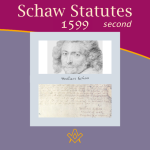 The Second William Schaw Statutes (1599) We look at a modern transcript of the second William Schaw Statutes dated 1599. An operative masons charter for stone cutters and layers in the building industry of the time. A set of rules and regulations including penalties. |
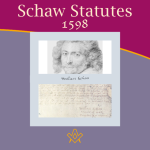 The First William Schaw Statutes (1598) We look at a modern transcript of the first William Schaw Statutes dated 1598. An operative masons charter for stone cutters and layers in the building industry of the time. |
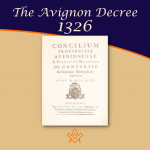 The Avignon Decree (1326) Papal Bull The several Papal declarations against Freemasons after the formation of the Grand lodge in England in 1717 are well known. The Avignon Decree (1326), published 400 years prior, is the earliest known document to set out the Catholic Church's intentions… |
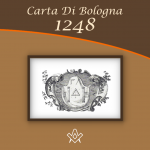 The Bologna Statutes Or Carta Di Bologna The Bologna Statutes or Carta Di Bologna 1248 - Masonic document of Operative Masonry, the oldest one found to date. |
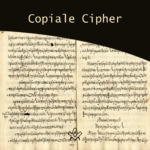 What is the connection between the Copiale Cipher and the great enlightened society of oculists ? |
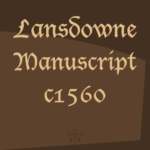 A very foolish legendary account of the origins of the Order of Freemasonry |
 The Graham Manuscript dating from 1726 is an early Masonic document that calls upon Noah and this 3 sons in respect to Masonry, an alternative allegory to the Hiram legend. |
 The Kirkwall Scroll is a hand-painted floor cloth depicting a myriad of symbolism |
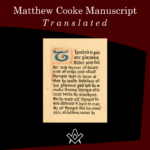 Matthew Cooke Manuscript was written c1450. A transcript of a yet older document, written by a Speculative Mason |
 Are you interested in the 'musty old documents of the past'? This article first appeared in The Builder magazine,1923 |
masonic knowledge
to be a better citizen of the world
share the square with two brothers

click image to open email app on mobile device



